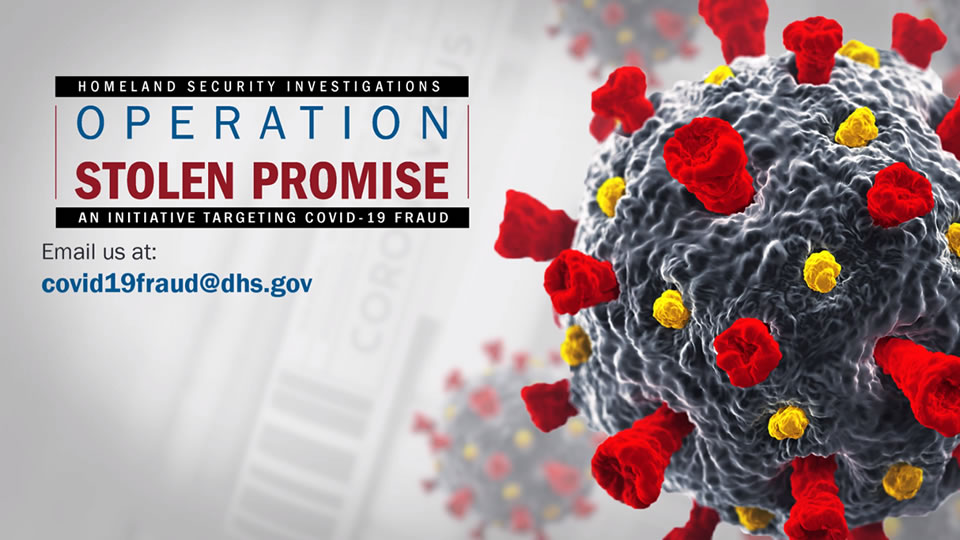SEATTLE – A Washington State man was charged in a criminal complaint unsealed today for fraudulently seeking over $1.1 million in COVID-19 relief guaranteed by the Small Business Administration (SBA) through the Economic Injury Disaster Loan (EIDL) and the Paycheck Protection Program (PPP) under the Coronavirus Aid, Relief and Economic Security (CARES) Act.
Special Agent in Charge Robert Hammer of U.S. Immigration and Customs Enforcement's (ICE) Homeland Security Investigation (HSI), Acting Assistant Attorney General Brian C. Rabbitt of the Justice Department's Criminal Division, U.S. Attorney Brian T. Moran of the U.S. Attorney's Office for the Western District of Washington, Inspector General J. Russell George of the Treasury Inspector General for Tax Administration, Inspector General Gail S. Ennis of the Social Security Administration, and Inspector General Hannibal "Mike" Ware of the SBA made the announcement.
Austin Hsu, 46, of Issaquah, Washington, was charged by criminal complaint, unsealed today after his initial appearance, in the Western District of Washington with one count of wire fraud. He made his initial appearance before U.S. Magistrate Judge Brian A. Tsuchida.
The complaint alleges that Hsu submitted nine fraudulent disaster loan applications on behalf of five different companies. Hsu, who is the owner and CEO of a company named Blackrock Services P.S. doing business as "Back 2 Health Bellevue" (Back 2 Health), received EIDL and PPP funds for Back 2 Health, and then used the names of Back 2 Health's current and former employees to apply for additional PPP loans under the names of other companies that he owned and controlled. The complaint also alleges that, in support of the fraudulent PPP loan applications, Hsu submitted fake federal tax filings.
The complaint further alleges that, in support of the fraudulent EIDL loan applications, Hsu made numerous false and misleading statements about the companies' respective business and operations. For example, Hsu incorporated a company named Blueline Capital LLC (Blueline) in June 2020 for the purpose of applying for an EIDL loan in July 2020, and then misrepresented to the SBA that Blueline had been in business since 2017 and that, as of Jan. 31, 2020, Blueline had nine employees and gross receipts of over $1.5 million. In truth, Blueline had no business or operations.
The CARES Act is a federal law enacted March 29. It is designed to provide emergency financial assistance to millions of Americans who are suffering the economic effects resulting from the COVID-19 pandemic. One source of relief provided by the CARES Act is the authorization of up to $349 billion in forgivable loans to small businesses for job retention and certain other expenses through the PPP. In April 2020, Congress authorized over $300 billion in additional PPP funding.
The PPP allows qualifying small businesses and other organizations to receive loans with a maturity of two years and an interest rate of one percent. Businesses must use PPP loan proceeds for payroll costs, interest on mortgages, rent and utilities. The PPP allows the interest and principal to be forgiven if businesses spend the proceeds on these expenses within a set time period and use at least a certain percentage of the loan towards payroll expenses.
The EIDL program is designed to provide economic relief to small businesses that are currently experiencing a temporary loss of revenue. EIDL proceeds can be used to cover a wide array of working capital and normal operating expenses, such as continuation of health care benefits, rent, utilities, and fixed debt payments. If an applicant also obtains a loan under the PPP, the EIDL funds cannot be used for the same purpose as the PPP funds.
A criminal complaint is merely an allegation and all defendants are presumed innocent until proven guilty beyond a reasonable doubt in a court of law.
This case was investigated by ICE Homeland Security Investigations, the U.S. Treasury Inspector General for Tax Administration, Social Security Administration – Office of Inspector General, and Small Business Administration – Office of Inspector General. Trial Attorney Christopher Fenton of the Criminal Division's Fraud Section and Assistant U.S. Attorney Steven Masada of the Western District of Washington are prosecuting the case.
Anyone with information about allegations of attempted fraud involving COVID-19 can report it by calling the Department of Justice's National Center for Disaster Fraud Hotline at 866-720-5721 or via the NCDF Web Complaint Form.
Individuals across the world can report suspicious criminal activity to the ICE Homeland Security Investigations (HSI) Tip Line 24 hours a day, seven days a week.
Highly trained specialists take reports from both the public and law enforcement agencies on more than 400 laws enforced by ICE HSI.
If you would like to report suspicious criminal activity:
- Call 866-DHS-2-ICE (866-347-2423) (from U.S. and Canada)
- Call 802-872-6199 (from other locations around the globe)



